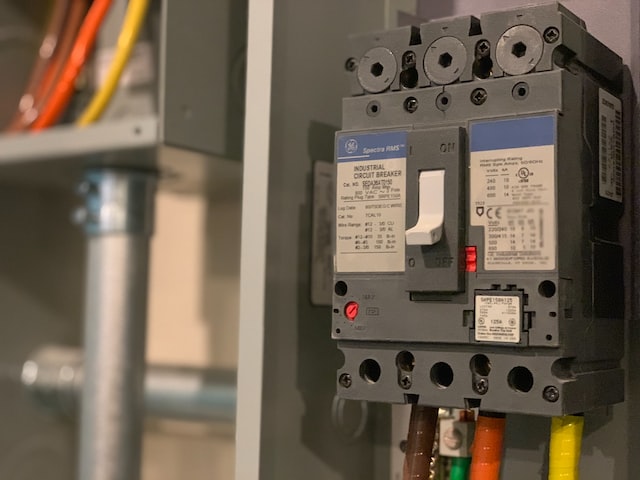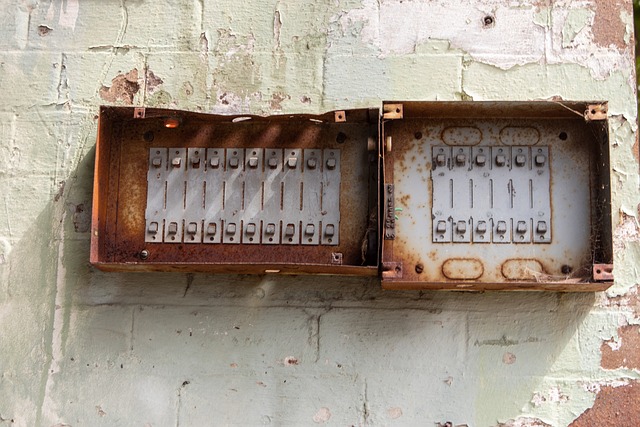Fuses are older technology and work by literally “blowing” or melting when too much current flows through them, creating an open circuit. Circuit breakers, on the other hand, work by “tripping” or opening the circuit when too much current is detected and can be reset once the problem is fixed.
What is a circuit breaker?
(Photo by Troy Bridges on Unsplash )

A circuit breaker is an electrical switch that automatically interrupts the flow of current in a circuit when it detects an overload or short. This protects the circuit from damage by preventing it from continuing to draw too much current.
Circuit breakers are typically found in the main electrical panel, which is the distribution point for all of the circuits in your home. The panel will have a number of different slots for various types of breakers, including those for specific appliances or areas of the home.
When a circuit breaker trips, it will flip to the “off” position, breaking the circuit and interrupting the flow of current. You can reset a circuit breaker by simply flipping it back to the “on” position.
What is a fuse?
(Image by Squirrel_photos from Pixabay )

A fuse is a device that is used to protect an electrical circuit from overloading. It is a safety device that contains a strip of metal that melts when the current flowing through it becomes too high. This interrupts the flow of electricity and prevents the circuit from being overloaded.
Which one is better?
Circuit breakers can be reset after an overload, while fuses must be replaced. Circuit breakers also provide protection against short circuits and ground faults, while fuses only provide protection against over currents. Additionally, circuit breakers can be used to selectively shut off circuits, while fuses will shut off all connected circuits when tripped.
When to use a circuit breaker Vs. A fuse
There are a few key differences between circuit breakers and fuses that will help you determine when to use each one.
-A circuit breaker can be reset after it trips, while a fuse must be replaced.
-Circuit breakers protect against overloads and short circuits, while fuses only protect against overloads.
-Circuit breakers are designed for repeated use, while fuses are not.
If you’re unsure which one to use in a particular situation, it’s always best to consult with an electrician.
How to replace a fuse
If a circuit breaker trips or a fuse blows, it means that there is an overload in the system. To fix this, you will need to replace the fuse or reset the circuit breaker.
To replace a fuse:
1. Turn off the power to the circuit at the main breaker panel.
2. Remove the old fuse from its socket.
3. Insert a new fuse of the same amperage into the socket.
4. Turn on the power to the circuit at the main breaker panel.
How to replace a circuit breaker
If your circuit breaker trips or if you have a blown fuse, you will need to replace it with a new one. Here is how to do so:
1. Turn off the power to the circuit breaker box.
2. Remove the cover of the box.
3. Find the blown fuse or tripped circuit breaker and remove it from the box.
4. Take the new fuse or circuit breaker and insert it into the box in the same spot as the old one.
5. Turn on the power to the circuit breaker box and test your new fuse or circuit breaker by flipping it on and off a few times.
Can I replace a fuse with a circuit breaker?
Yes, you can replace a fuse with a circuit breaker. In fact, many homes have circuit breakers instead of fuses. Circuit breakers are safer and more reliable than fuses, and they provide easier access to the electrical system if you need to turn off the power.
Which is safer fuse or circuit breaker?
There is no definitive answer as to whether fuses or circuit breakers are safer. They both have their pros and cons. Fuses are less likely to fail than circuit breakers, but they can be more dangerous because they can cause an electrical fire if they malfunction. Circuit breakers are more likely to fail than fuses, but they are less dangerous because they will trip and cut off the power before a fire can start.
What happens if I replace a 15 amp breaker with a 20 amp breaker?
If you replace a 15 amp breaker with a 20 amp breaker, the new breaker will trip at a higher amperage than the old one. This means that it will take longer for the new breaker to trip.
What are two advantages of using a fuse over a circuit breaker?
Advantages of Fuses
1. easier to reset: If a fuse blows, all you have to do is replace the blown fuse with a new one. Resetting a circuit breaker can sometimes be more complicated.
2. less expensive: Fuses are typically less expensive than circuit breakers. This makes them a good choice for budget-conscious homeowners or businesses.
Advantages of Circuit Breakers
1. can be reset: Unlike a fuse, which must be replaced when it blows, a circuit breaker can simply be reset. This makes them more convenient to use in most cases.
2. trip more slowly: When too much current flows through a circuit breaker, it trips more slowly than a fuse does. This gives you time to correct the problem before the power is cut off completely.
How many outlets can I add to a circuit?
As long as the new outlets are within the amperage rating of the circuit breaker or fuse, you can add as many outlets to the circuit as you need.
What happens if the fuse blows up?
If a fuse blows up, it means that there is too much current flowing through the circuit. This can be caused by a short circuit or by overload.
What can damage a circuit breaker?
A circuit breaker can be damaged by excessive current, voltage, or heat. Current flowing through the breaker can cause it to overheat and trip. If the breaker trips frequently, this can cause the contacts to weld together, making the breaker inoperative. Excessive voltage can cause the insulation on the breaker to break down, allowing current to arc across the contacts and damage them.
Featured Image by – Troy Bridges on Unsplash








